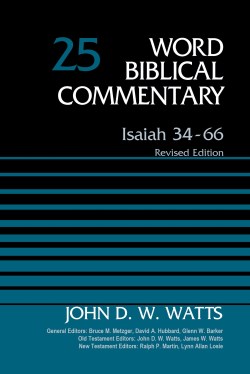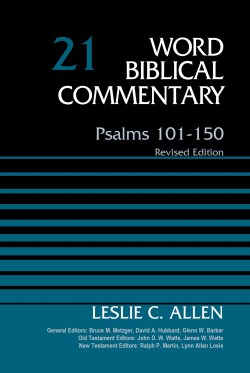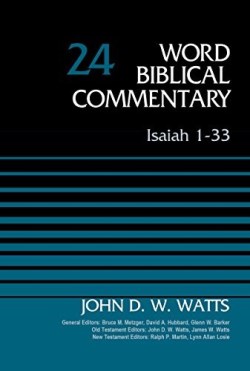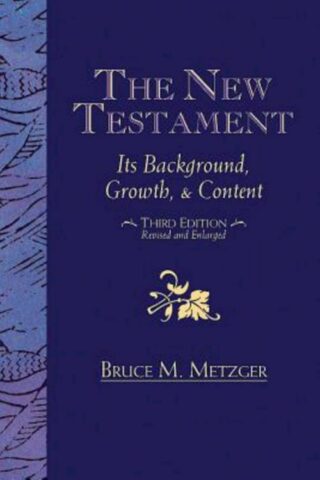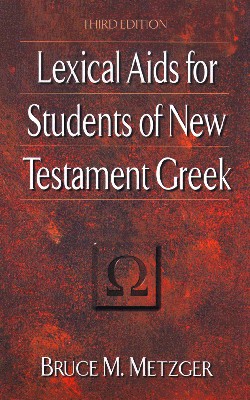Bruce Metzger
Showing all 5 results
-
Isaiah 34-66 (Revised)
$44.99Add to cartThe Word Biblical Commentary delivers the best in biblical scholarship, from the leading scholars of our day who share a commitment to Scripture as divine revelation. This series emphasizes a thorough analysis of textual, linguistic, structural, and theological evidence. The result is judicious and balanced insight into the meanings of the text in the framework of biblical theology. These widely acclaimed commentaries serve as exceptional resources for the professional theologian and instructor, the seminary or university student, the working minister, and everyone concerned with building theological understanding from a solid base of biblical scholarship.
Overview of Commentary Organization
*Introduction–covers issues pertaining to the whole book, including context, date, authorship, composition, interpretive issues, purpose, and theology.
*Each section of the commentary includes:
*Pericope Bibliography–a helpful resource containing the most important works that pertain to each particular pericope.
*Translation–the author’s own translation of the biblical text, reflecting the end result of exegesis and attending to Hebrew and Greek idiomatic usage of words, phrases, and tenses, yet in reasonably good English.
*Notes–the author’s notes to the translation that address any textual variants, grammatical forms, syntactical constructions, basic meanings of words, and problems of translation.
*Form/Structure/Setting–a discussion of redaction, genre, sources, and tradition as they concern the origin of the pericope, its canonical form, and its relation to the biblical and extra-biblical contexts in order to illuminate the structure and character of the pericope. Rhetorical or compositional features important to understanding the passage are also introduced here.
*Comment–verse-by-verse interpretation of the text and dialogue with other interpreters, engaging with current opinion and scholarly research.
*Explanation–brings together all the results of the discussion in previous sections to expose the meaning and intention of the text at several levels: (1) within the context of the book itself; (2) its meaning in the OT or NT; (3) its place in the entire canon; (4) theological relevance to broader OT or NT issues.
*General Bibliography–occurring at the end of each volume, this extensive bibliographycontains all sources used anywhere in the commentary.
-
Psalms 101-150 (Revised)
$44.99Add to cartThe Word Biblical Commentary delivers the best in biblical scholarship, from the leading scholars of our day who share a commitment to Scripture as divine revelation. This series emphasizes a thorough analysis of textual, linguistic, structural, and theological evidence. The result is judicious and balanced insight into the meanings of the text in the framework of biblical theology. These widely acclaimed commentaries serve as exceptional resources for the professional theologian and instructor, the seminary or university student, the working minister, and everyone concerned with building theological understanding from a solid base of biblical scholarship.
Overview of Commentary Organization:
*Introduction–covers issues pertaining to the whole book, including context, date, authorship, composition, interpretive issues, purpose, and theology.
*Each section of the commentary includes:
*Pericope Bibliography–a helpful resource containing the most important works that pertain to each particular pericope.
*Translation–the author’s own translation of the biblical text, reflecting the end result of exegesis and attending to Hebrew and Greek idiomatic usage of words, phrases, and tenses, yet in reasonably good English.
*Notes–the author’s notes to the translation that address any textual variants, grammatical forms, syntactical constructions, basic meanings of words, and problems of translation.
*Form/Structure/Setting–a discussion of redaction, genre, sources, and tradition as they concern the origin of the pericope, its canonical form, and its relation to the biblical and extra-biblical contexts in order to illuminate the structure and character of the pericope.
*Rhetorical or compositional features important to understanding the passage are also introduced here.*Comment–verse-by-verse interpretation of the text and dialogue with other interpreters, engaging with current opinion and scholarly research.
*Explanation–brings together all the results of the discussion in previous sections to expose the meaning and intention of the text at several levels: (1) within the context of the book itself; (2) its meaning in the OT or NT; (3) its place in the entire canon; (4) theological relevance to broader OT or NT issues.
*General Bibliography–occurring at the end of each volume, this extensive bibliographycontains all sources used anywhere in the commentary.
-
Isaiah 1-33 (Revised)
$52.99Add to cartThe Word Biblical Commentary delivers the best in biblical scholarship, from the leading scholars of our day who share a commitment to Scripture as divine revelation. This series emphasizes a thorough analysis of textual, linguistic, structural, and theological evidence. The result is judicious and balanced insight into the meanings of the text in the framework of biblical theology. These widely acclaimed commentaries serve as exceptional resources for the professional theologian and instructor, the seminary or university student, the working minister, and everyone concerned with building theological understanding from a solid base of biblical scholarship.
Overview of Commentary Organization
*Introduction-covers issues pertaining to the whole book, including context, date, authorship, composition, interpretive issues, purpose, and theology.
*Each section of the commentary includes:
*Pericope Bibliography-a helpful resource containing the most important works that pertain to each particular pericope.
*Translation-the author’s own translation of the biblical text, reflecting the end result of exegesis and attending to Hebrew and Greek idiomatic usage of words, phrases, and tenses, yet in reasonably good English.
*Notes-the author’s notes to the translation that address any textual variants, grammatical forms, syntactical constructions, basic meanings of words, and problems of translation. *Form/Structure/Setting-a discussion of redaction, genre, sources, and tradition as they concern the origin of the pericope, its canonical form, and its relation to the biblical and extra-biblical contexts in order to illuminate the structure and character of the pericope. Rhetorical or compositional features important to understanding the passage are also introduced here.
*Comment-verse-by-verse interpretation of the text and dialogue with other interpreters, engaging with current opinion and scholarly research.
*Explanation-brings together all the results of the discussion in previous sections to expose the meaning and intention of the text at several levels: (1) within the context of the book itself; (2) its meaning in the OT or NT; (3) its place in the entire canon; (4) theological relevance to broader OT or NT issues.
*General Bibliography-occurring at the end of each volume, this extensive bibliographycontains all sources used anywhere in the commentary. -
New Testament : Its Background Growth And Content
$34.99Add to cartThis text is a classic by one of America’s most widely respected New Testament scholars. It provides a clear and comprehensive introduction to the New Testament. In a straightforward and understandable style–without distortion or oversimplification–Prof. Metzger closely examines the historical background and content of the New Testament and details the role of scribes and translators in handing the Scriptures down through the centuries. Utilizing the finest modern scholarship, Dr. Metzger looks at the people, societies, and events that produced the New Testament. Palestinian Judaism, Greco-Roman paganism, sources of our knowledge of Jesus Christ, essential aspects of Christ’s teaching, sources and chronology of the apostolic age, the work of Paul, the general letters, and the Book of Revelation are all clearly illuminated. The Second edition of this book added an appendix on the formation of the canon of the New Testament and the work of scribes. The third edition will represent a substantial update of the 1965 text based on the New Revised Standard Version. In addition to stylistic changes, the author updates the text regarding research on the Dead Sea Scrolls and the Nag Hammadi tractates. This edition adds a glossary, 30 graphics and photos, and is resized to a larger 6×9 page.
-
Lexical Aids For Students Of New Testament Greek (Reprinted)
$18.00Add to cartThe beginning Greek student soon faces a vexing dilemma: a myriad of vocabulary words to learn and little time to learn them. One of the century’s leading Greek scholars offers a solid solution by organizing Greek words according to their frequency of appearance in the New Testament. Lexical Aids for Students of New Testament Greek helps students maximize their study by concentrating on the words that appear most often in the Greek New Testament.
This venerable resource, which has served beginning language students for over fifty years, is divided into two parts. Part one lists New Testament words according to their frequency of occurrence. The usefulness of such lists is obvious, writes Metzger. By consulting them the beginner will not, so to speak, waste his time memorizing words that occur only rarely in the New Testament. He can be assured that when he has learned, say, the first 513 words in the lists he then knows all of the words (other than proper names) that occur at least 25 times in the New Testament.
The second part of Lexical Aids for Students of New Testament Greek features another helpful list, grouping Greek words according to their root. Also included are appendixes that provide tools for learning Greek prepositions and the principal parts of verbs.

